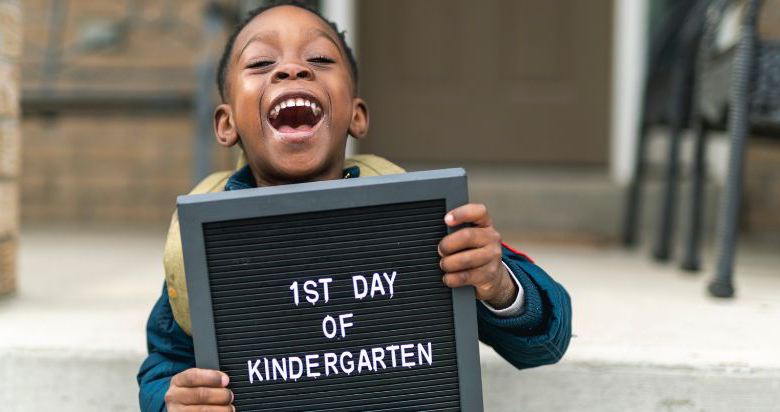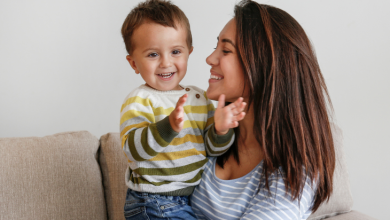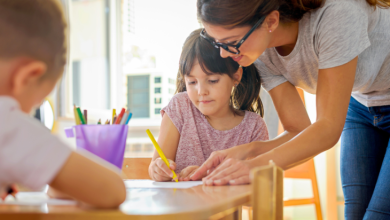A Parent’s Guide: Transitioning From Pre-K To Kindergarten

A Parent’s Guide: Transitioning From Pre-K To Kindergarten
Starting kindergarten marks a significant milestone in your child’s educational adventure, filled with new discoveries, friendships, and endless opportunities to learn and grow. In this post, we’ll provide you with everything you need to know to make this transition a smooth and positive experience for both you and your little one.
Moving from the familiar and nurturing environment of pre-k to the structured world of kindergarten can feel like a big leap! We’re here to assure you this transition is a natural progression in your child’s educational journey. Kindergarten is a place where your child will continue to explore, discover, and develop important skills that will set the foundation for their future academic success.
While the transition to kindergarten may seem like a big step, we’re here to help you and your child navigate through it with confidence and excitement. Together, we’ll explore the key differences between pre-k and kindergarten, discuss how to prepare your child emotionally and academically and address common concerns you may have along the way.
So, get ready to embark on this incredible adventure as we dive into the ins and outs of transitioning from pre-k to kindergarten. We hope you feel empowered and well-equipped to support your child during this important milestone. Let’s dive in and make this transition an amazing experience filled with joy, growth, and endless possibilities.
“You’re off to great places, today is your day! Your mountain is waiting- so get on your way!” – Dr. Seuss
The Purpose Of Kindergarten
Kindergarten is an important year in your child’s educational journey, serving as the bridge between preschool and elementary school. While it provides more structure than preschool, it is meant to provide a structured learning experience where children continue to develop social, emotional, and academic skills.
How Is Kindergarten Different From Preschool
When it comes to transitioning from pre-k to kindergarten, there are several key differences to be aware of. In kindergarten, there is an increased focus on academic skills, as it introduces more formal instruction in reading, writing, math, and other subjects while still keeping it fun.
Another notable difference is the length of the school day. Kindergarten typically involves a longer school day compared to pre-k, gradually preparing children for the long hours they will experience in the later years of their education. This extended time in school allows for a more comprehensive and structured learning experience.
Independence is also emphasized in kindergarten. Children are encouraged to take more responsibility for their learning and develop self-help skills. This newfound independence fosters confidence and empowers them to make decisions and contribute to their own educational journey.
Kindergarten introduces a more structured routine, which helps children navigate their day with ease. They will become familiar with specific activities, transitions, and classroom expectations. This structured environment provides a sense of stability and predictability, which is beneficial for their overall learning experience.
Moreover, kindergarten offers greater opportunities for social interaction. Children will have ample chances to interact and collaborate with their peers, fostering the development of important social skills like communication, teamwork, and problem-solving. These skills are essential for building strong relationships and navigating social dynamics as they progress through their educational journey.
Understanding these key differences between pre-k and kindergarten is crucial for parents to support their child’s transition effectively. By recognizing the academic, structural, and social aspects unique to kindergarten, you can ensure your child’s smooth adjustment to this exciting new phase of their education.
How To Prepare Your Preschooler For Kindergarten
Preparing your preschooler for kindergarten is an exciting journey filled with endless possibilities. Here are some helpful tips to ensure a smooth and positive transition:
Build Emotional Readiness
First and foremost, focus on building emotional readiness. Take the time to talk openly with your child about starting kindergarten and let them express their feelings. Whether they’re bubbling with excitement or feeling a tad nervous, assure them it’s perfectly normal.
Encourage Independence
Encourage independence by helping them develop self-help skills like dressing themselves and using the restroom independently. Watching their confidence soar will bring a big smile to your face!
Focus On Academic Readiness
Boosting academic readiness is another key step. Make learning fun by engaging in activities that build foundational skills. Play counting games, spot letters in everyday surroundings, and explore shapes and colors through arts and crafts. Introduce basic reading and writing concepts by reading books together and encouraging letter recognition and writing practice. Get creative with colorful markers or draw letters in sand—it’s all about making learning an adventure.
Fine Motor Skills
Don’t forget to work on fine motor skills, too. Engage in activities like cutting with child-safe scissors, stringing beads, and coloring. These activities not only strengthen their little fingers but also prepare them for the writing tasks they’ll encounter in kindergarten.
Visit The Classroom
To make the transition smoother, visit the kindergarten classroom before the school year begins. Let your child explore the environment, meet the teacher, and ask questions. This will help familiarize them with their new surroundings and build excitement for the upcoming adventure.
Work On A Routine
Establishing a consistent routine is key. Gradually adjust your child’s sleep schedule to match the kindergarten routine, ensuring they’re well-rested and ready for the exciting days ahead. Practice daily routines at home, such as unpacking their backpack and following instructions. The familiarity will boost their confidence and make them feel like pros on their first school day.
Encourage Social Skills
Encouraging social skills is equally important. Arrange playdates with other children their age, where they can practice sharing, taking turns, and resolving conflicts peacefully. Be a role model for kindness, empathy, and good manners, as they will learn best by watching you. Together, let’s cultivate a positive and inclusive attitude that will shine brightly in their kindergarten journey!
Preparing your preschooler for kindergarten is an adventure filled with joy and growth. With these tips, a sprinkle of enthusiasm, and your unwavering support, your little one will be ready to embrace the wonders of kindergarten and shine brightly in their new educational environment.
How Long Does It Take A Child To Transition To Kindergarten?
The adjustment period for kindergarten can vary from child to child, but rest assured, your kiddo will find their groove in no time. Just like learning to ride a bike or trying a new activity, it takes a little practice and patience to adjust to kindergarten.
Each child has their own unique timeline for settling into their new routine. Some children may adapt quickly within a matter of days, while others may take a few weeks to feel completely at ease. It’s all part of the exciting adventure, so don’t stress if your child takes more time than others to adjust.
During this adjustment period, it’s normal for children to experience mixed emotions. From the initial excitement to a touch of nervousness, they’re embarking on a brand-new journey. As parents, you’re there to provide the support and encouragement they need to navigate this transition.
Teachers and school staff are experts at creating a warm and welcoming environment where your child can explore, learn, and make new friends. They understand the importance of easing the transition and will be there to guide your little one every step of the way.
As a parent, your role is equally important. By maintaining open lines of communication with teachers, attending school events, and celebrating your child’s achievements, you’re sending a powerful message of support and enthusiasm. You may even be able to join your kiddo for lunch every now and then to join them in their new environment. Your positive involvement makes a world of difference.
Remember, it’s completely normal for children to take their time adjusting to kindergarten. Embrace their unique journey, celebrate their milestones, and offer reassurance along the way. With time, patience, and encouragement, your child will settle into their kindergarten routine and shine brightly in their new educational adventure.
You’ve Got This!
You now have the inside scoop on transitioning your child from pre-k to kindergarten. Armed with the right knowledge, a positive mindset, and a whole lot of love, you’re ready to make this transition a remarkable success. As your child embarks on their kindergarten journey, remember that this is a time of tremendous growth, discovery, and endless possibilities. They will embrace new experiences, forge new friendships, and continue to learn and develop in exciting ways.
Throughout this process, be their biggest cheerleader, their guiding light, and their source of unwavering support. Celebrate their achievements, big and small, and shower them with encouragement as they navigate the ups and downs of kindergarten life. You are in this together and by following this guide, you’ve got this.





